By David Tuller, DrPH
It’s a frightening time for everyone. As we know, people with underlying medical conditions are at greater risk from coronavirus. At the same time, many of these individuals long ago adopted some of the strategies everyone is now being asked to adopt. Certainly people with ME–or with what is referred to as CFS, CFS/ME, or ME/CFS–often have lots of practice sheltering at home and not socializing with other people.
A couple of days ago, the ME Association posted the following guidance from its medical adviser, Dr Charles Shepherd. I thought it would be helpful to repost it here, with the association’s permission. (Some of the information applies specifically to UK policies.)
**********
ME Association Guidance: Coronavirus and ME/CFS by Dr Charles Shepherd
24 March 2020
Latest UK Govt. data:
€œAs of 9.00am on 23 March 2020, a total of 83,945 people have been tested in the UK, of which 77,295 were confirmed negative and 6,650 were confirmed positive for the coronavirus infection.
€œAs of 1.00pm on 23 March 2020, 335 patients in the UK who tested positive for coronavirus (COVID-19) have died.€
Although there are cases throughout the UK the largest numbers are in London and the South East, with a further ‘hot spot’ in theest Midlands.
Europe is the epicentre of a very serious coronavirus pandemic (= an epidemic that involves several countries) with even larger numbers being reported in Italy, Switzerland, Spain and Germany. But no European country remains free of infection.
Disease modelling continues to indicate that the numbers here in the UK will continue to grow on a sharp upward curve from now on, probably for the next 6 to 8 weeks, possibly longer.
Hopefully, a plateau will then be reached, and the numbers will start to steadily decline during the summer months. So, we are almost certainly going to be in a state of emergency, along with serious disruption to every aspect of normal life, for many months to come.
Two items of better news is that on one day last week no new cases were reported from Wuhan province in China and that testing on both drug treatments and a vaccine are now happening.
The key preventative measures remain exactly the same:
- Avoiding infections on surfaces wherever possible,
- Thoroughly washing hands, fingers and wrists after touching surfaces away from home,
- Not touching your face,
- Keeping well away from anyone who has any signs of an infection,
- Staying at home wherever possible, and.
- Keeping a safe (two metres matters!) distance from everyone else if you do go out.
ME/CFS qualifies as both an underlying and at-risk medical condition in relation to coronavirus infection and people with this diagnosis should be considered vulnerable and practice the social distancing measures outlined by the Government.
All these measures are set out in the detailed guidance below and we will continue to provide updates at least on a weekly basis.
The Government has, quite rightly, been introducing even stricter guidance on the need for social distancing, reduced social mobility and, where necessary, social isolation €“along with the closure of bars, restaurants, theatres and leisure centres last Friday.
People with underlying health conditions that make them more vulnerable to the lung complications of this virus (which may or may not be the case with ME/CFS €“ at this stage we just don’t know), or have a condition like ME/CFS where an infection such as this will almost certainly cause a relapse, or significant exacerbation of symptoms, need to be doing everything they can to protect themselves, and to socially distance themselves from other people.
UK Government Guidance:
- How everyone can help stop coronavirus (social distancing).
- Staying at home if you think you have coronavirus (self-isolating).
- How to protect extremely vulnerable people (shielding).
The extremely vulnerable
On Sunday March 22,the Government issued further guidance on social isolation and practical support for people in a new government list covering the extremely vulnerable category.
The full list can be found on the NHS and Govt. websites, but it mainly relates to people who are being treated for cancer, have had an organ transplant, have a serious lung disease, and anyone taking immunosuppressive drugs like high dose oral steroids.
The most important item in this new guidance relates to strict social isolation and the need to stay at home for at least the next twelve weeks.
It also describes the practical help that people can request in relation to obtaining food and medicines €“ which will be co-ordinated by local hubs and supplied by local authorities and the army. The food parcels will be free to start with.
More details will be going out this week by text and letter to everyone who should be on this list giving information about how the scheme will operate.
Please note that M.E. and CFS are not included in the list of extremely vulnerable people.
UK Govt. Guidance:
Update and Overview
On a personal basis, I am now be doing all I can to stay at home. If I do go out I definitely avoid situations where close physical contact and the spread of infected droplets in the air might occur. In practical terms this means that I am doing all my work meetings by video conferencing and phone as are my colleagues in the charity.


I will, however, continue to take my dog out for a walk each day around the village €“ because mental well-being is also very important and close physical contact from a dog walk in a very rural area is non-existent. Provided you live in an area where it is possible to go outside and meet very few people, and keep a safe distance if you do, this is a very low risk activity and permissible under the new restrictions.
My contact with friends and family, especially children, has been reduced to almost zero. I am constantly reviewing what I’m doing on a day-to-day basis. And if there are cases of infections being reported locally to where I live I will reduce my very limited outside mobility still further.
The degree to which people with ME/CFS who are mobile, and can still leave home, decide to socially distance themselves, or even go into complete social isolation, has to take account of a number of factors and common sense.
This will depend on where you live, who looks after you and who else can take over any essential household activities, like shopping, your age (the over 70s need to give this very serious consideration), whether you have any other serious health conditions involving the immune system or involvement of the lungs or heart, and to what extent you have work or other outside responsibilities.
One of the few positives to emerge from this situation is that communities are coming together €“ certainly in rural areas. Here in rural Gloucestershire, a group has been formed in our village to help vulnerable people who cannot get out, or have been told to stay indoors, and the community village shop is already organising home deliveries. We are supporting one vulnerable neighbour. Elsewhere, local What’s App support groups are being set up.
With all schools closing last Friday, but remaining open for children of essential employers, the previous dilemma about what to do with children who have ME/CFS has now been resolved. But thought will now have to be given to what sort of allowances will have to be made for a child who has been off school due to ME/CFS and would have been taking crucial exams this year relating to entry into further education.
Work may be difficult if you are well enough to be doing a normal and essential job and you quite understandably decide that you do not want to add to the risk of catching an infection €“ especially if this involves public transport or meeting people.
Under UK Health and Safety legislation, employers have a clear duty to make suitable modifications for employees who have health problems in a situation like this. However, achieving a satisfactory modification may be easier said than done.
I have updated our guidance here in the main section under Employment and made an additional website statement last week explaining why people with ME/CFS should be regarded as having a health condition that makes them more vulnerable to coronavirus infection.
- Useful legal advice relating to employment and coronavirus.
For people with severe ME/CFS the guidance remains the same regarding life inside your home. This largely relates to trying to make sure that any essential visitors to your home are infection-free, that they wash their hands and wrists thoroughly with soap and water, and preferably use an effective alcohol-based sanitiser gel as well.
Social isolation is already a major issue for people with severe ME/CFS, but people in this group do now have to seriously consider whether visits from a friend or family to the home are essential (e.g. bringing shopping) and need to be reduced or stopped for the time being €“ even when they are OK to keep a good distance.
We have had several reports from people on social media regarding problems with social care and this is covered in the main guidance below €“ as is support for carers.
Finally, there are all kinds of misleading and sometimes even dangerous advice and fake news appearing on the internet claiming that high dose vitamins and supplements are an effective way in reducing the risk.
A family member is working for a government department that is solely dealing with fake news and misinformation €“ so please take care when it comes to information passed on by well-meaning friends and relatives.
There is no scientific evidence that any drug, vitamin or supplement will reduce the risk of catching this infection or can be used to treat this infection.


ME Association Information and Guidance
The basic MEA information and guidance that was originally issued in February is updated every week to take account of the rapidly changing situation here in the UK and the fact that while the situation in China appears to have stabilised, coronavirus infection has now spread to many other countries and there is now a serious pandemic affecting much of Europe.
| €œAs of 9.00am on 23 March 2020, a total of 83,945 people have been tested in the UK, of which 77,295 were confirmed negative and 6,650 were confirmed positive for the coronavirus infection.
€œAs of 1.00pm on 23 March 2020, 335 patients in the UK who tested positive for coronavirus (COVID-19) have died.€ |
At the moment the risk of someone with ME/CFS who is not housebound coming into contact with someone who has coronavirus is still fairly low. But this will probably soon move from low to moderate if you are not confined to the home and meeting other people.
Viral infections are a very common factor in causing symptom exacerbation and relapse of ME/CFS €“ sometimes severe and prolonged. Everyone with ME/CFS must be taking simple self-help measures that reduce the risk of both spreading infections and catching infections from other people €“ these are described in more detail below.
All the information in this blog is based on what we know, and do not currently know, in the current situation. But the situation is developing, and we will try and keep you updated via social media where possible.
Contents
A. What is the coronavirus? What tests are available? Is there any treatment? When will we have a vaccine?
B. What are the symptoms?
C. What should you do if you have a new onset of cold or flu-like symptoms?
D. Who is most at risk of catching this infection?
E. How can you prevent yourself from getting infected? Respiratory and hand hygiene
F. What contact can you still have with other people? Social mobility, distancing and isolation
G. What help is there for carers?
H. Education and Employment
I. Foreign Travel
J. Hospital and other medical appointments
K. MEA statement on neurological classification and whether people with ME/CFS should be classed as being vulnerable in relation to coronavirus
L. Further information


A. What is the coronavirus? What tests are available? Is there any treatment? When will we have a vaccine?
It appears that this is a virus that has spread from animals (possibly bats or pangolins) to the human population in the Wuhan region of China back in November 2019 €“ where the main focus of infection originated, and the first case was reported on 19th November.
Significant numbers of cases were then increasingly reported in countries like Iran, Japan, South Korea and Singapore €“ where people from China had visited. Cases are now being reported throughout the UK and in almost all other parts of Europe €“ Italy, France and Spain in particular €“ initially being linked to foreign travel or contact with someone who has been abroad.
However, we are now in a situation where a significant degree of person-to-person infection is also starting to occur.
The virus is spread by tiny viral containing droplets €“ which arrive in the air through coughing, sneezing and just breathing. So, coughs and sneezes really do spread diseases!
The time between contracting the infection and developing symptoms appears to range from a few days to up to 2 weeks €“ during which time an infected person will be passing on the virus even though they may not have any symptoms.
Infectivity appears to be most significant during the early infective stage. Children, who may not have any symptoms because they make a good immune response, are an important potential source of infection.
A test for the virus was developed very quickly. However, due to shortages of supply and the fact that the testing procedure is time consuming and requires taking health service staff away from other duties it is not as available as it ought to be €“ especially for NHS and other essential workers who need to know if they have the infection.
Another test has been developed to show if someone has antibodies to a past infection and now has a degree of immunity and should be safe to carry on as normal. Work is also going on to find a home testing kit.
At present, there is no drug treatment available for this infection €“ although hydroxychloroquine (which is used to treat malaria and some rheumatic diseases because it has immunomodulatory actions) and some of the current antiviral drugs that are used to treat HIV infection are being assessed.
In our current state of knowledge there is no scientific evidence that any drug, vitamin or supplement will reduce the risk of catching this infection or reduce the severity.
Although rapid progress is being made in developing and testing a vaccine in both the UK and USA, this will require proper testing on human volunteers for efficacy and safety €“ so it won’t be available for many months.
B. What are the symptoms?
Health professionals are on a very steep learning curve here as this is a completely new virus. And, as with most viral infections, there is a range of initial presentations, symptoms and severity.
Most healthy people €“ probably around 80% €“ will experience a mild flu-like illness and possibly some chest symptoms, or no symptoms at all, and recover. Hospitals are, however, starting to see an increasing number of younger people, some with no underlying health conditions, with a severe infection.
Symptomatic cases normally start off over a very short period of time with a cluster of flu-like symptoms. Feeling unwell, having a fever (with a thermometer defined temperature of 37.8C or above), and fatigue are common initial symptoms whereas cold-like sniffles and sneezing appear less common.
In a minority of cases the infection then passes to the lungs where it can cause a dry (unproductive) and persisting cough and, if more severe, shortness of breath.
This can then progress into a far more serious infection involving the lungs, which can quickly progress to pneumonia and even prove fatal.
A few cases are also now presenting with a gastrointestinal symptoms, including nausea and diarrhoea. There are also reports of symptoms involving loss of taste and smell €“ due to damage to the nerve cells for taste and smell in the throat and nose.
At the moment the mortality rate in higher risk groups (see below) is around 1 to 3 in every 100 people who are taken ill €“ which makes it worse than flu, where the mortality rate is closer to 1 in every 1000.
C. What should you do if you have a new onset of cold or flu like symptoms?
The current advice from the NHS is that anyone who develops a fever and dry cough must self-isolate. If you live alone and you have symptoms of coronavirus illness (COVID-19), however mild, stay at home for 7 days from when your symptoms started.
If you live with others and you are the first in the household to have symptoms of coronavirus, then you must stay at home for 7 days, but all other household members who remain well must stay at home and not leave the house for 14 days. The 14-day period starts from the day when the first person in the house became ill.
If you feel more unwell you should contact NHS 111.
Do not go to your GP surgery or hospital. However, you may find that your GP is willing to offer a telephone or video consultation.
Home management is the same as for any flu like infection €“ paracetamol for pain, plenty of fluids and rest.
Please note that there is some emerging evidence to indicate that non-steroidal anti-inflammatory drugs like ibuprofen/Brufen can exacerbate this virus €“ so they should be avoided. More information can be found on the NHS website.
If the chest symptoms become more severe, especially difficulty with breathing, speak to NHS 111 or your GP.
Different to ME/CFS symptoms
Flu-like and nasal symptoms are obviously very common in ME/CFS. But the key differentiating features here are the relatively sudden development of the three Fs:
- Feeling unwell,
- Increased Fatigue,
- Fever and a persistent dry cough.
D. Who is most at risk of catching this infection?
Most of those who develop a more serious or fatal infection are elderly (i.e. over the age of 70) and are less able to mount a good immune defence, or have a long term health condition €“ especially one that causes immune system depression or one that affects the heart or lung function (e.g. brittle or unpredictable asthma, COPD).
Children and young people, whose immune systems are much better at mounting a good defence against new infections, are generally avoiding symptoms, or coping well, and not developing serious complications. But there are now cases of young people developing a more severe illness.
The situation in pregnancy remains uncertain €“ which is why the new government recommendation to avoid contact with other people is erring on the side of caution.
Current research evidence indicates that ME/CFS involves a range of immune system problems, including immune system activation, rather than immune system deficiency. How the immune system in ME/CFS reacts to this new infection remains uncertain €“ as does how people with ME/CFS will react to it. But, we all need to err on the side of caution.
Viral infections are a very common factor in causing symptom exacerbation and relapse of ME/CFS €“ sometimes severe and prolonged. If you do catch this infection, as with any infection, the aftereffects are likely to be more serious.
This is why taking steps to avoid catching coronavirus, or any other flu-like virus at this time of year, are very important.
E. How can you prevent yourself from getting infected? Respiratory and hand hygiene
At the moment the view from the virologists is that every person who contracts coronavirus is then passing it on to around 3 to 5 people €“ so it’s a fairly infectious/contagious virus when it comes to person to person spread.
As with flu viruses at this time of year, there are a number of simple practical precautions that will significantly reduce the chance of picking up this infection.
These should be adopted by everyone:
- Infection containing droplets from coughs and sneezes in an infected person stay in the air for a short time and then land on surfaces where they can remain infective for several hours, possibly even longer, and in this case possibly up to 72 hours. The infection appears to survive longer on hard surfaces (i.e. metal, glass, plastic and cardboard) than soft surfaces like fabrics and clothing.
- The first step involves avoidance. Steer clear of public places (where possible) €“ such as public transport €“ where people may be coughing and sneezing. The general rule of thumb is to keep 6 feet/2 metres or more away from other people.
- The second step involves washing your hands, fingers and wrists whenever you have been in contact with a surface that other people have been touching.
Examples of high-risk objects and surfaces include public toilets, cash machines, keyboards, mobile phones, handrails, door handles, trays that used for security checks in buildings and airports.
Thorough hand, finger and wrist washing with soap and warm water for 30 seconds after contact with potentially infected surfaces is the best thing to do €“ if facilities are available. - Alcohol containing antiseptic/sterilising wipes and gels are also very useful if you are out and about. Alcohol dissolves the lipid/fatty coat around the virus and helps to inactivate it. The alcohol content of these wipes should be 62% or more. There has been a big demand for antiseptic wipes and gels, and they are now becoming difficult to find. The best time to shop for one appears to be first thing in the morning! Please note that antibacterial wipes and gels are not going to be effective.
- DO NOT TOUCH YOUR FACE, MOUTH OR EYES IF YOUR HANDS ARE NOT CLEAN!
- Cheap face masks may help to stop spreading infections but are of no real value in stopping you catching one as the coronavirus particles are minute and can only be kept out of the mouth and nose and eyes (which are another route for infection) by the sort of mouth and eye covering masks used by health workers. More expensive ones used by health workers, if they have Department of Health approval, will have a protective effect.
- People who are housebound should ask visitors with any sort of infective symptoms to stay away. Healthy visitors should be asked to thoroughly wash their hands and possibly wear disposable gloves €“ especially if the visit involves close personal contact for nursing or social care purposes.
- Opening the post and parcels: We are still learning a lot about this virus, but we do know that it can survive on surfaces for several hours and survival rates are much better on hard surfaces including cardboard.
So, there is a possible risk of contamination from the post and parcels that arrive. In practical terms all the post should be opened at once and hands washed afterwards. People who are extra vulnerable should avoid handling the post. - If you have any sort of infection keep away from other people and sneeze into a tissue or handkerchief.
- Finally, although there is no way of enhancing your immune system to prevent this infection, one important way in which the immune system can be weakened is disrupted sleep. Please do all you can to try and get a solid night’s sleep at the moment €“ although we of course recognise that this can be difficult for people with ME/CFS.
How to wash your hands:
- BBC Video: Dr Adele McCormick from the University of Westminster demonstrates how germs spread and what the best methods are to avoid catching a virus including how to wash your hands properly.
How to safely clean your mobile phone:
- Dr Lena Ciric, a microbiologist from University College London, says you can effectively clean your phone using just household soap and water.
F. What contact can you still have with other people? Social mobility, distancing and isolation
For people with ME/CFS who are not housebound, considering how to reduce social mobility needs to be regularly reviewed, especially if you are elderly (i.e. over 70), or have another health condition that creates a significant risk €“ e.g. heart or lung disease.
Being in contact with people and with surfaces that may be contaminated with the virus is the most likely way of picking up this infection €“ which is why stringent new restrictions on social mobility have now been introduced
To what extent this is put into practice may need to be based on individual circumstances €“ age, severity of ME/CFS, presence of other medical conditions, location, your practical needs in relation to food etc, and level of social support €“ and common sense.
However, following the Prime Minister’s statement on 23 March this will have to involve restricting out of home activities to essential things like shopping for food and medicines and essential medical appointments.
The Prime Minister’s announcement on social distancing was the most stringent set of measures ever introduced in this country to prevent people leaving their homes €“ except for very good reasons.
The only reasons for leaving home from now on are for:
- shopping for basic necessities, as infrequently as possible.
- one form of exercise a day €“ for example a run, walk, or cycle €“ alone or with members of your household.
- any medical need, to provide care or to help a vulnerable person.
- travelling to and from work, but only where this is absolutely necessary and cannot be done from home.
The Prime Minister said the Government will be acting in three key ways to ‘ensure compliance‘:
- closing all shops selling non-essential goods,€‹ including clothing and electronic stores, and other premises including libraries, playgrounds and outdoor gyms, and places of worship.
- stopping all gatherings of more than two people in public €“ excluding people you live with.
- stopping all social events€‹, including weddings, baptisms and other ceremonies, but excluding funerals.
Government advice and restrictions on social mobility are likely to change again if the number of cases fails to slow down.
One of the few positives to emerge from this situation is that communities are coming together €“ certainly in rural areas. Here in rural Gloucestershire a group has been formed in the village to help vulnerable people who cannot get out and the community village shop is now organising home deliveries.
And, in the small Cumbria village, where our family came from, I was told on Sunday that they had signed up over 300 volunteers. We are already supporting one vulnerable neighbour. So, it’s important to check out this sort of support €“ in addition to what the government is now organising.
For people with severe ME/CFS the guidance remains the same. This largely relates to trying to make sure that any visitors to your home are infection free, that they wash their hands and wrists thoroughly with soap and water, and preferably use an alcohol-based sanitiser gel as well.
Social isolation is already a major issue for people with ME/CFS. But people in this group do now have to consider whether visits from friends and family need to be reduced or stopped for the time being.
If you are in a position where you need to escalate social distancing to social isolation €“ i.e. being totally housebound and having no regular contact with other people, there is detailed government guidance on social isolation and other measures below.
- How everyone can help stop coronavirus (social distancing).
- Staying at home if you think you have coronavirus (self-isolating).
- How to protect extremely vulnerable people (shielding).
G. What help is there for carers?
- Carers UK has produced some very useful information for carers and the people who employ them (updated 23rd March).
The subject of help for carers was discussed on MEA Facebook last week. We haven’t yet heard from the Govt. specifically about measures to help the social care sector.
H. Education and Employment
With all schools closing on Friday 20 March, but remaining open for children of essential employers, the previous dilemma about what to do with children who have ME/CFS has now been resolved. However, thought will now have to be given as to what sort of allowances will need to be made for a child who has been off school due to ME/CFS and would have been taking crucial exams relating to further education later in the year.
Everyone who can is now being urged to work from home, but some people are in essential jobs (e.g. nursing) where this just isn’t possible.
The situation here may be more difficult if you are well enough to be doing your normal job and you decide that you do not want to add to the risk of catching an infection €“ especially if this involves using public transport, touching lots of surfaces that other people have touched, regularly meeting people, or changing to a position in the health service where this involves contact with people who are infected.
Under UK Health and Safety legislation, employers have a clear duty to make suitable modifications for employees who have health problems in a situation like this and the MEA has issued a statement which explains why having ME/CFS makes someone vulnerable in relation to coronavirus infection.
- ACAS has produced some very helpful work-related information for employers and employees.
- The UK Government has also produced guidance for employees and employers that it will keep updated.
- Chartered Institute of Personnel and Development: Useful legal advice relating to employment and coronavirus.
If you are having problems with your employer or human resources department you can ask for input from the occupational health department. If you belong to a professional body or trade union they should have someone who can provide free legal advice.
I. Foreign Travel
The situation here has been changing very rapidly as new cases appear in large numbers in countries outside China and travel to almost all other countries outside the UK is becoming progressively restricted or practically impossible.
The Foreign Office is providing regular and specific updates on the situation regarding non-essential to travel to all foreign countries.
Airports, aeroplanes and cruise ships are also fairly high-risk places for picking up infections. Plans for any form of future foreign travel will to have to be put on hold and holidays abroad cancelled if departure was due in the next few months at least.
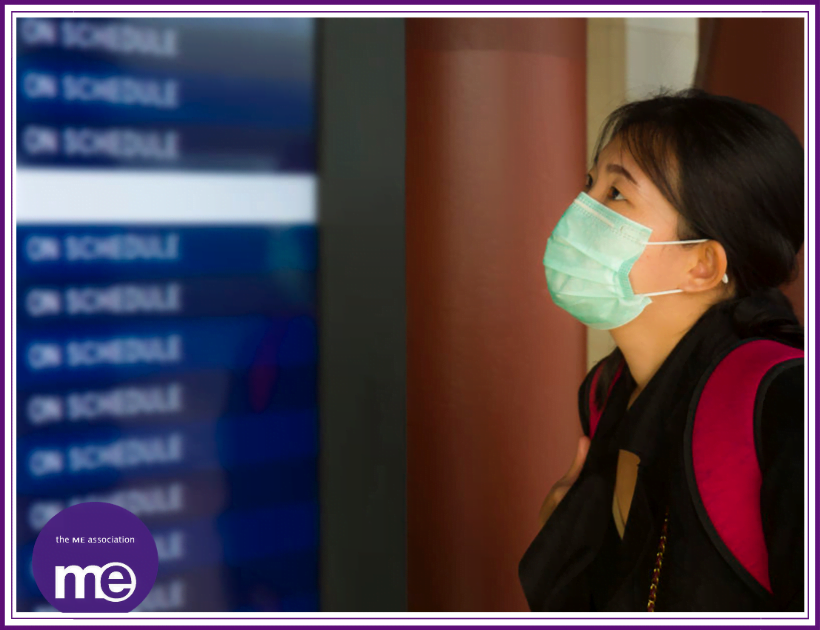

J. Hospital and other medical appointments
Hospitals, surgeries and other medical premises have to be regarded as places of increased risk when it comes to infection €“ so are best avoided unless you really need to go there.
Routine hospital appointments, along with other types of medical appointments €“ including physiotherapy, chiropody etc. €“ and operations are also likely to cancelled or postponed as the situation worsens. The same situation should apply to private practitioners providing alternative and complementary therapies.
If your appointment is for something that does not require a clinical examination the preferable option is to postpone the appointment or check to see if a telephone or video consultation could be arranged. While GPs are moving swiftly to arrange video and telephone appointments the hospital bureaucracy and lack of technology makes this more difficult.
K. MEA statement on neurological classification and whether people with ME/CFS should be classed as being vulnerable in relation to coronavirus
UK Govt. Guidance: Social Distancing:
€œWe are advising those who are at increased risk of severe illness from coronavirus (COVID-19) to be particularly stringent in following social distancing measures.
€œThis group includes those who are:
- aged 70 or older (regardless of medical conditions)
- under 70 with an underlying health condition listed below (i.e. anyone instructed to get a flu jab as an adult each year on medical grounds):
e.g. chronic neurological conditions, such as Parkinson’s disease, motor neurone disease, multiple sclerosis (MS), a learning disability or cerebral palsy.€
ME/CFS is an underlying health/chronic neurological condition that is likely to be exacerbated by coronavirus infection. Reference above is made to the NHS ‘flu vaccine list’ €“ which is being misinterpreted by some health professionals to mean that people with ME/CFS are not at increased risk.
The list of people who should receive a free NHS flu jab does not specify every single neurological condition that is eligible. It refers to chronic neurological disease and mentions a few examples:
€œThose with chronic liver disease, immunosuppression and chronic neurological disease are at increased relative risk of mortality if they contract flu compared to the general population.€ Source: NHS England.
The Government and Department of Health accept the WHO classification of ME/CFS as a neurological disease (in ICD10 G93:3). NHS England also makes it clear that M.E. is an ‘intermittent and unpredictable’ long-term neurological condition (Source: NHS England: LTC: Neurological).
In addition, Dame Sally Davies, the former Chief Medical Officer, confirmed that people with ME/CFS should have a flu vaccine if they want one.
Therefore, ME/CFS does qualify as both an underlying and at-risk medical condition in relation to coronavirus infection and people with this diagnosis should be considered vulnerable.
L. Further information
If you think there is any possibility that you may have this infection and you have a diagnosis of ME/CFS, phone the NHS 111 helpline. Self-isolate and do not go to your GP surgery or hospital.
- Keep an eye out for updates from the UK Government. You can sign-up for email alerts.
- A useful source of new information is listening to the daily Downing Street Press Conference, which is carried live on BBC News 24 and Sky News.
- Some local volunteer services are starting to operate practical assistance with shopping etc. for people who are confined to their homes. Contact your local council or local volunteer bureau or check your town/village/community website.
The ME Association website will continue to carry any important new Government announcements and discussions on all aspects of coronavirus and ME/CFS are taking place on MEA Facebook, Twitter, and Instagram every day.
Important note:
This information is intended to be used as general guidance on coronavirus infection in relation to ME/CFS. If you require individual guidance or advice please consult your GP, who can take this information into consideration.
Image credits: 123RF/maridav/KaterynaKon/JozefPolc




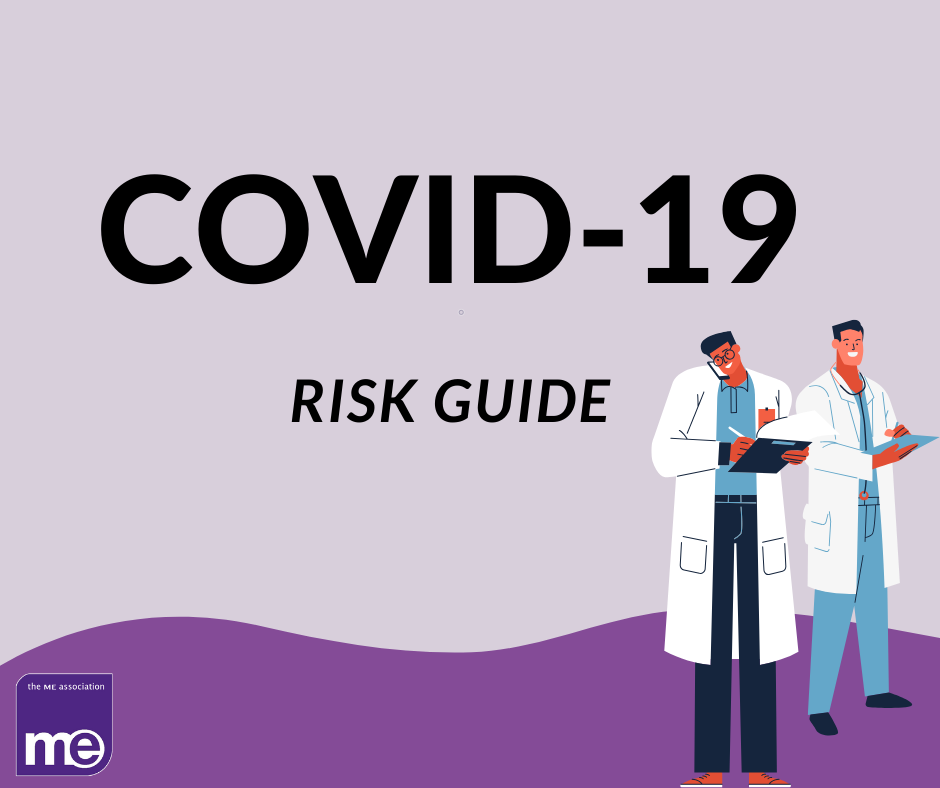
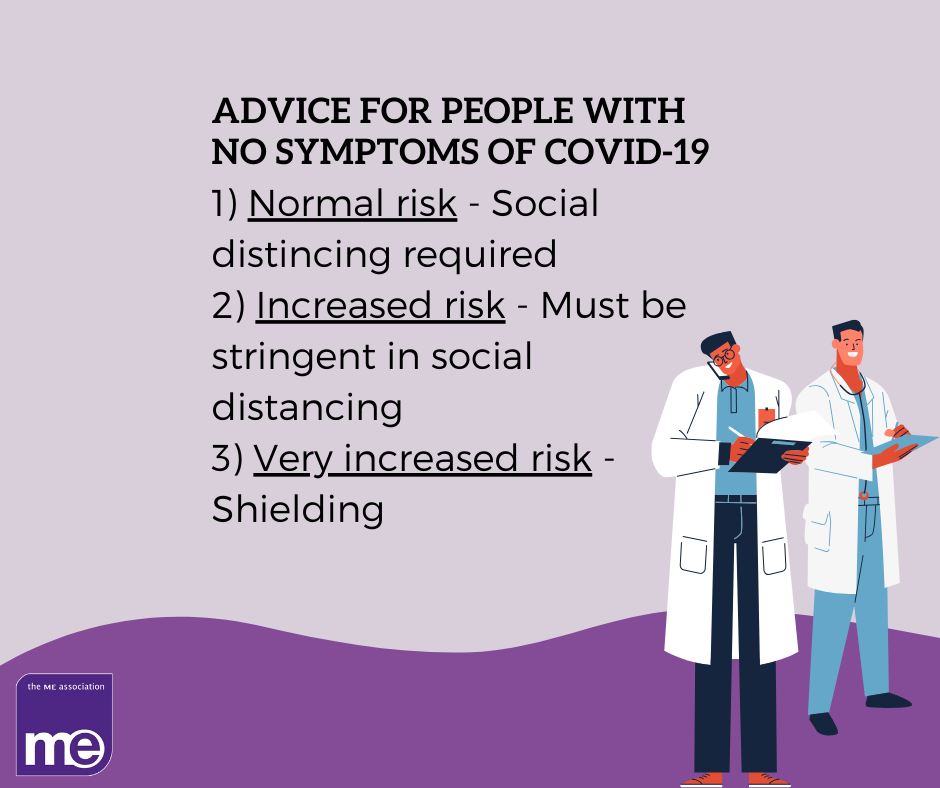
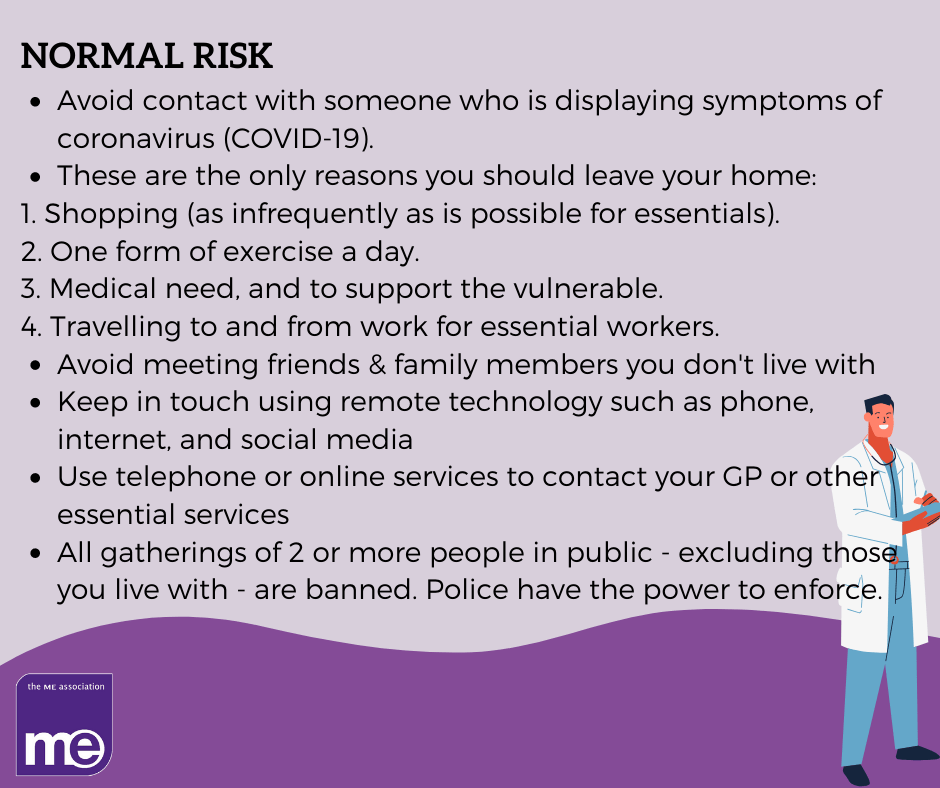

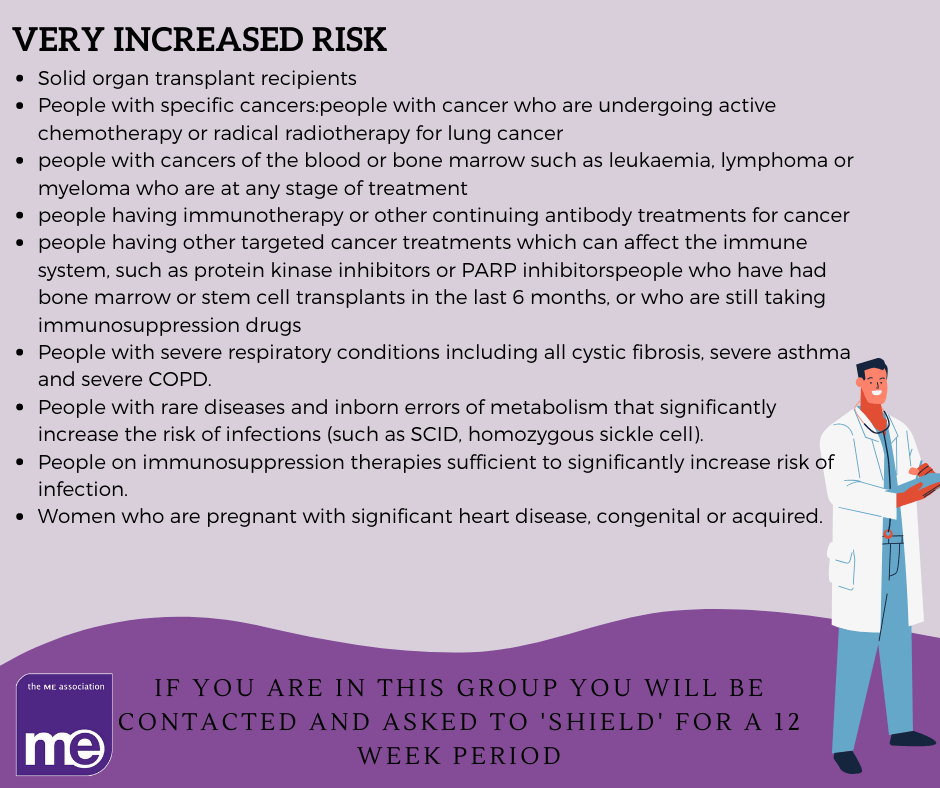
Comments are closed.